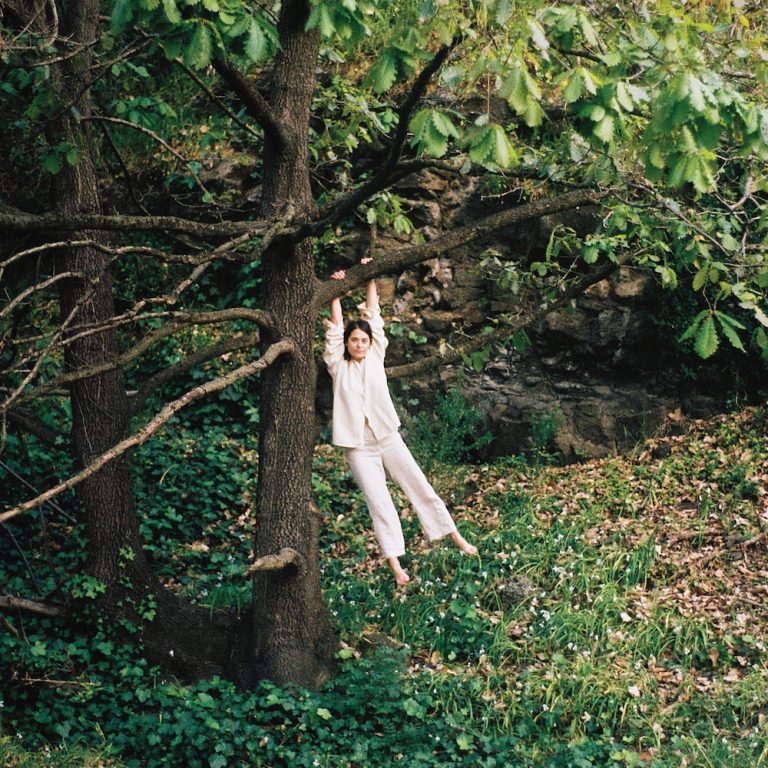There’s something exciting about a debut. Perhaps we anticipate and respond to it as we would a birth, associating it with innocence and unlimited potential, an Edenic period prior to the artist becoming acclimated to industry norms and the ups and downs of precarious popularity. A new artist emerges on their own terms, or so we like to believe, their early vision pure of the influences and pressures that inevitably accompany tenure in the music biz.
2021 has already marked the release of several stellar debuts, including Beth Lee’s Waiting on You Tonight, Dry Cleaning’s New Long Leg, Lady Dan’s I Am the Prophet, Paris Texas’s Boy Anonymous, and Back Country, New Road’s For the First Time (to name but a handful). Add to that list Maple Glider’s To Enjoy Is the Only Thing, a set of nine enchanting tracks courtesy of singer-songwriter Tori Zietsch.
From the opening song, “As Tradition,” we’re introduced to Zietsch’s gift for evocative tunes, sensuous vocals, and lyrics that address love, loss, addiction, codependency, and the need for honest self-assessment. “Love is just a word I have learned I may use at my own expense,” she sings, her voice fragile yet confident, tremulous yet crystalline. As the track progresses, minimal piano and drum parts offer a casual yet elegant accompaniment to Zietsch’s layered vocals.
“I know you see the beauty in dust so / I try to lift all of it up and press it against my eyelids / hoping my lashes will find hints / carry them down to the fine print of how I see all of the world,” Zietsch sings on “View from This Side”, illustrating how a mazy lyric can be rendered immediately accessible via an enthralling refrain and irresistible voice. “Swimming” is a textural gem, shimmering vocals and transportive melodies dappled with reverb. “Friend” describes how a long-term relationship; in this case, between band members, often involves a range of support and betrayals. “Friend, you were on both sides / pulling me up and dragging me down,” Zietsch sings on the first two choruses, shifting to “Friend, I’ve been on both sides / pulling you up and tearing you down” on the final chorus, depicting the way in which all parties involved play a role when it comes to building and undermining trust.
“Be Mean, It’s Kinder Than Crying” is the most austere track on the project, Zietsch accompanied by what sound like bare fifths played on an acoustic guitar. This lo-fi-ish approach, rather than seeming overly minimal, highlights Zietsch’s songcraft and vocal aptitude. “Good Thing” features a stark first verse that segues into a sumptuous chorus. The well-worn approach of adding drums and instrumental accents on the second verse lands as surprisingly fresh, even oddly inventive. In an album brimming with hooks and expressive vocals, the third verse is distinctly enrolling. “But I guess that’s how we learn / by setting fire to things that bring us life / before we’ve got to watch them burn / and so I’ll say goodbye / because I’d rather kill a good thing / than wait for it to die,” Zietsch sings, demonstrating her bent for poetic diarism and dramatized wisdom.
“Performer” portrays a person burdened by loneliness: “Wafting in the eagerness of early December / I’m floating whilst everything I know is cascading / down into the sinkhole.” When Zietsch sings, “I am uncertain I can play as I have played before / but I am a performer, of course I’ll perform,” she may be alluding to the relentlessness of a touring schedule (such things did in fact occur during pre-Covid times and will indeed occur again), though the line more broadly tackles the way in which each of us operates according to our hardwiring and conditioning, following cognitive and behavioral scripts or programs that frequently prove impossible to overcome. The album’s closer, “Mama, “It’s Christmas,” is a stunning snapshot of a brother who regularly disappears for days, apparently due to an addiction and/or mental-health issues. It’s easy to imagine the song being covered by a variety of living and dead artists (Shovels & Rope, Lera Lynne, and Johnny Cash come to mind).
Like Weyes Blood and Pearl Charles, among others, Tori Zietsch draws from, contemporizes, and ultimately transcends canonic sources, including Karen Carpenter, Carole King, and Carly Simon, particularly in terms of melodic construction and vocal cadence/timbre. The result is a debut replete with seductive songs, signature vocals, and intriguing lyrical forays. Hopefully, To Enjoy Is the Only Thing will receive the attention it deserves. More pressingly, hopefully Zietsch will be blessed with continued inspiration and relative equanimity as she navigates the caprices of pop culture.

